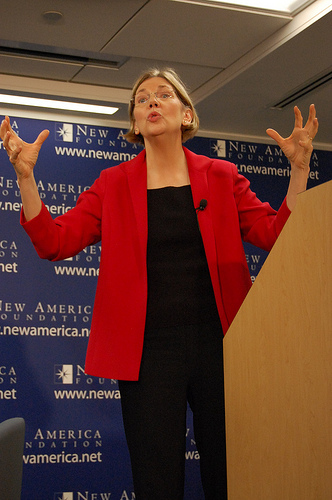
Elizabeth Warren, head of the new Bureau of Consumer Financial Protection. Flickr/New America Foundation
At last count, dozens of congressmen and numerous state attorneys general have demanded investigations into or have already begun scrutinizing the nation’s largest mortgage companies amid allegations of deception and fraud in the foreclosure process. Several major banks—JPMorgan Chase, Bank of America—have announced freezes on foreclosures. Then, on Monday, Bloomberg reported that attorneys general in 40 states were poised to unveil a sprawling joint investigation into the use of dubious foreclosure paperwork—crucial legal filings carelessly signed in such a way that allegedly violates federal rules—at multibillion-dollar institutions like JPMorgan, B of A, and Ally Financial, formerly GMAC.
What these investigations will surely lay bare, and what consumer advocates and legal aid attorneys have described for years, is the broken, fragmented system of regulation and protection that’s allowed this massive foreclosure fraud to occur. To be clear, the current debacle involves the practices of companies and/or subsidiaries called mortgage servicers, the middlemen of the housing industry who take your payments, provide customer service, and handle foreclosures when a borrower defaults on his or her loan. As I’ve reported before, there are few cops on the beat when it comes to regulating mortgage servicers. Which is why, more than ever, the country needs the new Bureau of Consumer Financial Protection, a single watchdog to oversee not just one link but the entire complex chain of events for consumers involved with the mortgage industry.
Here are some statistics for you. In 2009, the Department of Housing and Urban Development received almost 2,500 complaints about mortgage servicers, a 379 jump from two years earlier. Yet HUD’s record of enforcement against servicers is mediocre at best. It doesn’t help that a trio of other agencies—the Federal Trade Commission (FTC), Office of the Comptroller of the Currency, and Office of Thrift Supervision—claimed oversight of this checkered industry. The OTS and OCC’s regulatory records are even worse: At the time I wrote my story, “Always Be Foreclosing,” last summer, an OTS spokesman could name only one enforcement—ever—against a servicer; an OCC spokesman couldn’t name any at all. (The OTS, I should add, will soon be folded into the OCC, limiting the regulatory clutter somewhat.) “This is a very underregulated part of the system,” Jack Guttentag, a professor emeritus of finance at the Wharton School in Pennsylvania, told me. “It shouldn’t be, because it’s the part where the consumer has no place to protect themselves.”
The FTC has done a better job cracking down on servicers, winning multimillion-dollar settlements against abusive servicers. But even the commission’s actions are reactionary, sporadic, and ultimately of little help to screwed-over homeowners.
This lackluster and balkanized oversight of the servicing industry helps to explain why companies passed off bogus paperwork and allegedly committed fraud on the court for as long as they did. Looking to state attorneys general or Congress to fix the industry’s oversight gaps is naive at best—they might penalize mortgage servicers, but before long they’ll have moved onto their next cause celebre. This is where a consumer protection bureau dedicated to proactively safeguarding American consumers comes into play. Odds are, the kinds of assembly line-like foreclosure processes that’ve landed banks in hot water would never have lasted so long nor grown to such size (one Chase employee, or “robo signer,” describes 18,000 legal filings passing through her department every month) with an independent consumer watchdog in place. If you needed any more evidence why a tough consumer watchdog was needed, the ongoing foreclosure mess—to which there’s no solution that won’t either screw homeowners or further sink the housing market (or both)—is your case in point.












